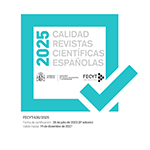Ortega y Gasset on the Alleged Inconvenience of Reading Don Quixote at School
Abstract
This article presents the stance taken by José Ortega y Gasset in the debate that took place in early-twentieth-century Spain regarding the convenience of reading Don Quixote in schools. To this end, we start by describing, albeit briefly, the state of Ortega y Gasset’s thought in 1920, when he writes Biología y pedagogía, the essay with which we shall concern ourselves. According to Ortega y Gasset, Don Quixote must not be read in the classroom because it does not contribute to the development of the students’ spontaneous life, or natura naturans. In order to foster this development, Ortega y Gasset suggests leaving Don Quixote aside and resort to myths such as Odysseus or Heracles because their exploits would excite the students’ vital pulse. However, we suggest several reasons why the aim stated by Ortega y Gasset —and several other highly valuable educational benefits— could be reached resorting to the reading of selected passages of Don Quixote instead of the feats of Odysseus and Heracles.
Downloads
Article download
License
In order to support the global exchange of knowledge, the journal Logos. Anales del Seminario de Metafísica is allowing unrestricted access to its content as from its publication in this electronic edition, and as such it is an open-access journal. The originals published in this journal are the property of the Complutense University of Madrid and any reproduction thereof in full or in part must cite the source. All content is distributed under a Creative Commons Attribution 4.0 use and distribution licence (CC BY 4.0). This circumstance must be expressly stated in these terms where necessary. You can view the summary and the complete legal text of the licence.











